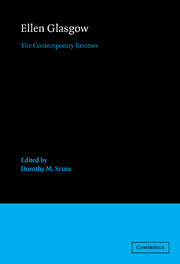Book contents
- Frontmatter
- Contents
- Series Editor's Preface
- Preface
- Acknowledgments
- Introduction
- The Descendant (1897)
- Phases of an Inferior Planet (1898)
- The Voice of the People (1900)
- The Battle-Ground (1902)
- The Freeman and Other Poems (1902)
- The Deliverance (1904)
- The Wheel of Life (1906)
- The Ancient Law (1908)
- The Romance of a Plain Man (1909)
- The Miller of Old Church (1911)
- Virginia (1913)
- Life and Gabriella (1916)
- The Builders (1919)
- One Man in His Time (1922)
- The Shadowy Third and Other Stories (1923)
- Barren Ground (1925)
- The Romantic Comedians (1926)
- They Stooped to Folly (1929)
- The Sheltered Life (1932)
- The Old Dominion Edition of the Works of Ellen Glasgow (1929-33)
- Vein of Iron (1935)
- The Virginia Edition of the Works of Ellen Glasgow (1938)
- In This Our Life (1941)
- A Certain Measure (1943)
- Index
A Certain Measure (1943)
Published online by Cambridge University Press: 04 May 2010
- Frontmatter
- Contents
- Series Editor's Preface
- Preface
- Acknowledgments
- Introduction
- The Descendant (1897)
- Phases of an Inferior Planet (1898)
- The Voice of the People (1900)
- The Battle-Ground (1902)
- The Freeman and Other Poems (1902)
- The Deliverance (1904)
- The Wheel of Life (1906)
- The Ancient Law (1908)
- The Romance of a Plain Man (1909)
- The Miller of Old Church (1911)
- Virginia (1913)
- Life and Gabriella (1916)
- The Builders (1919)
- One Man in His Time (1922)
- The Shadowy Third and Other Stories (1923)
- Barren Ground (1925)
- The Romantic Comedians (1926)
- They Stooped to Folly (1929)
- The Sheltered Life (1932)
- The Old Dominion Edition of the Works of Ellen Glasgow (1929-33)
- Vein of Iron (1935)
- The Virginia Edition of the Works of Ellen Glasgow (1938)
- In This Our Life (1941)
- A Certain Measure (1943)
- Index
Summary
John Chamberlain, “Books of the Times,” New York Times, 14 October 1943, p. 19
Ellen Glasgow has always gone her own way. As a young woman, growing up in a Virginia that still felt the need of clinging to pre-Civil War tradition, she set her face against the prevailing code of chivalrous sentimentality that was spoiling all Southern fiction. What the South needed, she told herself, was a literature of blood and irony in place of moonlight, wisteria, mint juleps and memories of Marse Robert, knight of the Confederacy. Modern realism, in America, is popularly supposed to have emerged and swept eastward from the flat lands of the Middle West. But Stuart Sherman observed back in the mid- Twenties that realism, in the person of Ellen Glasgow, “crossed the Potomac twenty-five years ago going north.”
As a reader who knows only the later phases of Ellen Glasgow's work, I am not the most competent person in the world to judge A Certain Measure, which is a book made up of the collected prefaces to thirteen of Miss Glasgow's novels. But even though I know only four of the novels in question, I derived a great deal of satisfaction from Miss Glasgow's reflections on the art of her own fiction. Taken together, the thirteen prefaces constitute an amazingly well integrated philosophy of the novel. They also contain an urbane and wittily ironic commentary on manners and morals going back half a century and more.
- Type
- Chapter
- Information
- Ellen GlasgowThe Contemporary Reviews, pp. 443 - 476Publisher: Cambridge University PressPrint publication year: 1992



